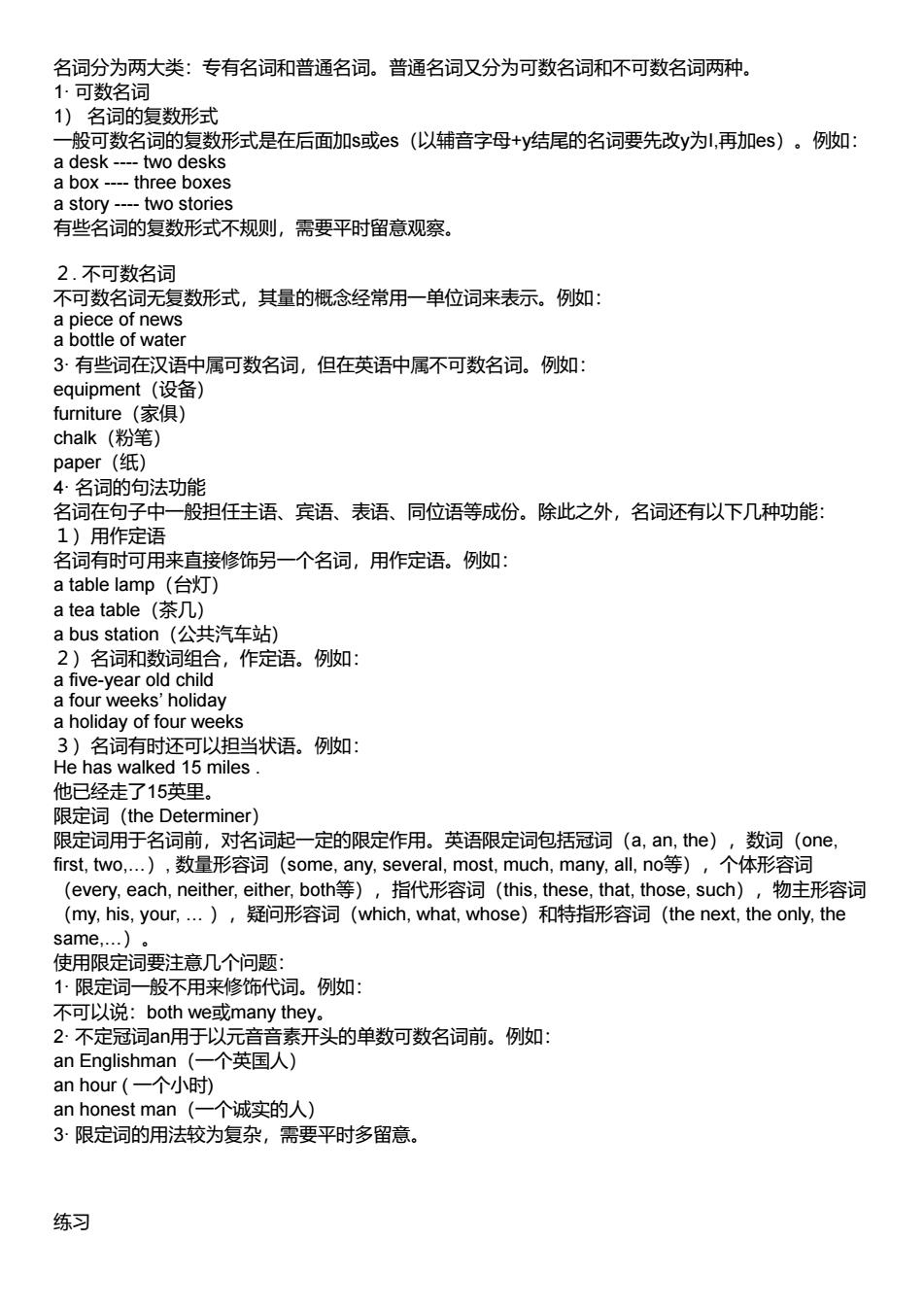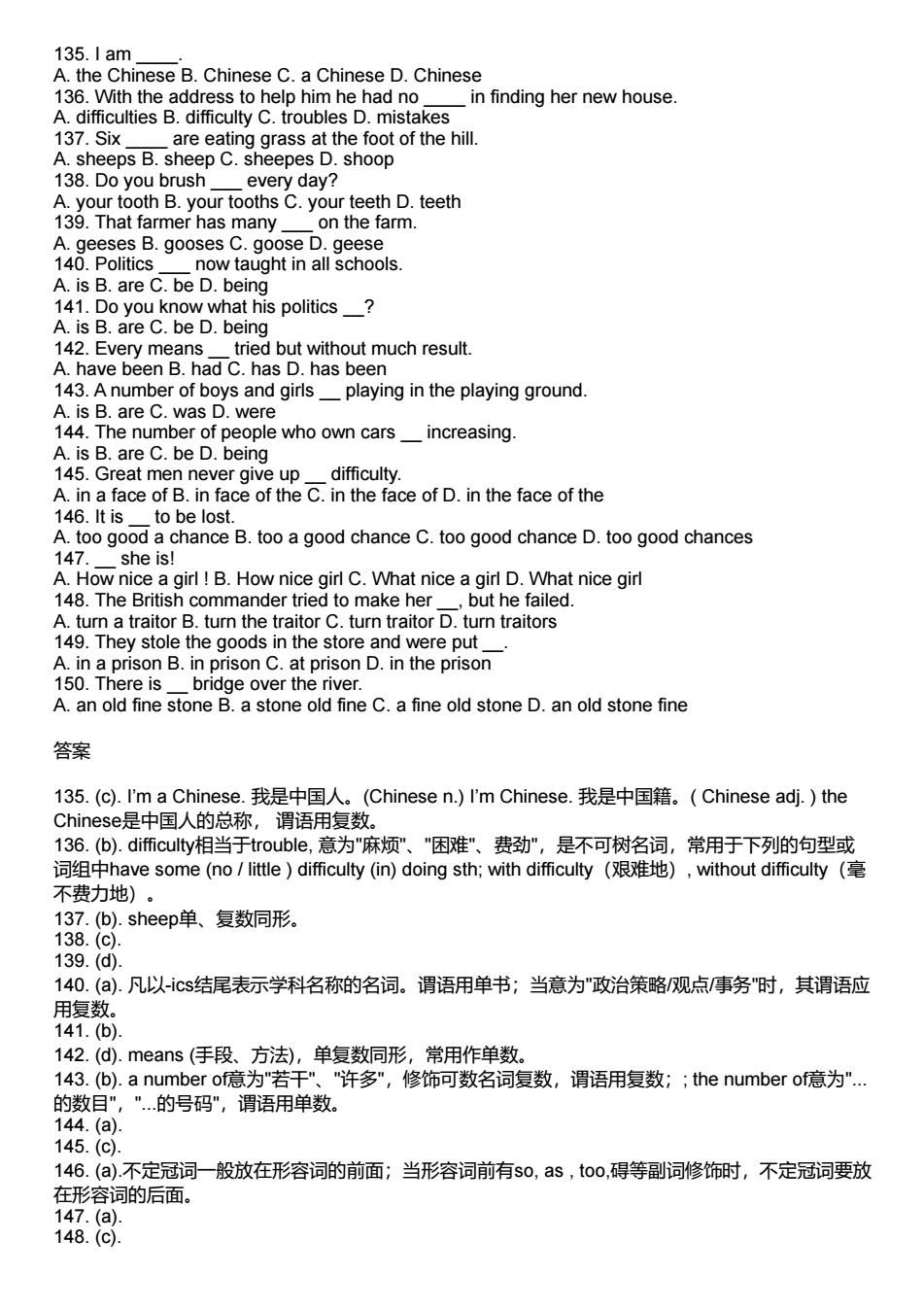
名词分为两大类:专有名词和普通名词。普通名词又分为可数名词和不可数名词两种。 1可数名词 1)名词的复数形式 般可数名词的复数形式是在后面加s或es(以辅音字母+y结尾的名词要先改y为l,再加es)。例如 ee bo a story-two stories 有些名词的复数形式不规则,需要平时留意观察 2.不可数名词 不可数名词无复数形式,其量的概念经常用一单位词来表示。例如: 号有些司在汉语中可数名词,但在英语中属不可数名词。如: equipment(设备) furniture(家俱) chak(粉笔) paper(纸) 4·名词的句法功能 名词在句子中一般担任主语、宾语、表语、同位语等成份。除此之外,名词还有以下几种功能 1)用作定语 名词有时可用来直接修饰另 一个名词,用作定语。例如: a table lamp(台灯) a tea table(茶几) a bus station(公共汽车站) 2)名词和数词组合,作定语。例败如: a five-year old child a four weeks'holiday a holiday of four weeks 3)名词有时还可以担当状语。例如: He has walked 15 miles 他已经走了15英里。 定词(the Determiner 限定词用于名词前 对名词起一定的限定作用。英语限定词包括冠词(a,an,the),数词(one, frst,two,-),数量形容词(some,any,several,.most,much,many,al,no等),个体形容词 (every,each,neither,.either,both等),指代形容词(this,these,that,those,such),物主形容词 (my,his,your,.),疑问形容词(which,what,whose)和特指形容词(the next,.the only,the 使用限定词要注意几个问题 1·限定词一般不用来修饰代词。例如: 不可以说:both wei或many they。. 2不定冠词a用于以元音音素开头的单数可数名词前。例如: an Englishma 一个英国人) an hour(一个小时) an honest man(一个诚实的人) 3·限定词的用法较为复杂,需要平时多留意。 练习
名词分为两大类:专有名词和普通名词。普通名词又分为可数名词和不可数名词两种。 1· 可数名词 1) 名词的复数形式 一般可数名词的复数形式是在后面加s或es(以辅音字母+y结尾的名词要先改y为I,再加es)。例如: a desk - two desks a box - three boxes a story - two stories 有些名词的复数形式不规则,需要平时留意观察。 2. 不可数名词 不可数名词无复数形式,其量的概念经常用一单位词来表示。例如: a piece of news a bottle of water 3· 有些词在汉语中属可数名词,但在英语中属不可数名词。例如: equipment(设备) furniture(家俱) chalk(粉笔) paper(纸) 4· 名词的句法功能 名词在句子中一般担任主语、宾语、表语、同位语等成份。除此之外,名词还有以下几种功能: 1)用作定语 名词有时可用来直接修饰另一个名词,用作定语。例如: a table lamp(台灯) a tea table(茶几) a bus station(公共汽车站) 2)名词和数词组合,作定语。例如: a five-year old child a four weeks’ holiday a holiday of four weeks 3)名词有时还可以担当状语。例如: He has walked 15 miles . 他已经走了15英里。 限定词(the Determiner) 限定词用于名词前,对名词起一定的限定作用。英语限定词包括冠词(a, an, the),数词(one, first, two,.), 数量形容词(some, any, several, most, much, many, all, no等),个体形容词 (every, each, neither, either, both等),指代形容词(this, these, that, those, such),物主形容词 (my, his, your, . ),疑问形容词(which, what, whose)和特指形容词(the next, the only, the same,.)。 使用限定词要注意几个问题: 1· 限定词一般不用来修饰代词。例如: 不可以说:both we或many they。 2· 不定冠词an用于以元音音素开头的单数可数名词前。例如: an Englishman(一个英国人) an hour ( 一个小时) an honest man(一个诚实的人) 3· 限定词的用法较为复杂,需要平时多留意。 练习

135.1am A.the Chinese B.Chinese C.a Chinese D.Chinese 136. _in finding her new house. A.sheeps B.sheep c sheep of the es D.shoop 138.Do you brush y dav? A.your tooth B.your tooths C.your teeth D.teeth 139.That farmer has many on the farm. Politics now taught in all schools are C.be D. is politics_? is B. YekeYDwtt me d but without much result. A.have been B.had C.has D.has beer 143.A number of boys and girls playing in the playing ground. A.is B.are C.was D.were 144.The number of people who own cars_increasing. A.is B.are C.be D.being en never give up 10 ce B.too a good chance C.too good chance D.too good chances 141 he isl A.How nice a girl B.How nice girl C.What nice a girl D.What nice girl 148.The British commander tried to make her but he failed. a8T3yeeBeeoasg6oenertntaos 150aPrs on B.in prison C. at prison D.in the prison e over the e stone a stone old fine C.a fine old stone D.an old stone fine 答案 135.(c,.m a Chinese.我是中国人。(Chinese n).m Chinese.我是中国籍。(Chinese adj.)the Chinese是中国人的总称,谓语用复数。 136.(b).difficulty相当于trouble,意为"麻烦"、"困难"、费劲",是不可树名词,常用于下列的句型或 至中have some (no/litle)dificulty(in)doing sth:with difficulty(限难地),without difficulty((毫 17.sheep单、复数同形, 140.().凡以ics结尾表示学科名称的名词。谓语用单书;当意为"政治策略/观点事务"时,其谓语应 用复数 141.(b). 142.(d).means(手段、方法),单复数同形,常用作单数。 143.(b).a number of億为"若干"、"许多",修饰可数名词复数,谓语用复数;;the number of億为” 的数目” ”.的号码”,谓语用单数。 144 (a) 145.c. 146,a)不定冠词一般放在形容词的前面;当形容词前有s0,as,t00,碍等副词修饰时,不定冠词要放 词的后面
135. I am _. A. the Chinese B. Chinese C. a Chinese D. Chinese 136. With the address to help him he had no _ in finding her new house. A. difficulties B. difficulty C. troubles D. mistakes 137. Six _ are eating grass at the foot of the hill. A. sheeps B. sheep C. sheepes D. shoop 138. Do you brush _ every day? A. your tooth B. your tooths C. your teeth D. teeth 139. That farmer has many _ on the farm. A. geeses B. gooses C. goose D. geese 140. Politics _ now taught in all schools. A. is B. are C. be D. being 141. Do you know what his politics _? A. is B. are C. be D. being 142. Every means _ tried but without much result. A. have been B. had C. has D. has been 143. A number of boys and girls _ playing in the playing ground. A. is B. are C. was D. were 144. The number of people who own cars _ increasing. A. is B. are C. be D. being 145. Great men never give up _ difficulty. A. in a face of B. in face of the C. in the face of D. in the face of the 146. It is _ to be lost. A. too good a chance B. too a good chance C. too good chance D. too good chances 147. _ she is! A. How nice a girl ! B. How nice girl C. What nice a girl D. What nice girl 148. The British commander tried to make her _, but he failed. A. turn a traitor B. turn the traitor C. turn traitor D. turn traitors 149. They stole the goods in the store and were put _. A. in a prison B. in prison C. at prison D. in the prison 150. There is _ bridge over the river. A. an old fine stone B. a stone old fine C. a fine old stone D. an old stone fine 答案 135. (c). I’m a Chinese. 我是中国人。(Chinese n.) I’m Chinese. 我是中国籍。( Chinese adj. ) the Chinese是中国人的总称, 谓语用复数。 136. (b). difficulty相当于trouble, 意为"麻烦"、"困难"、费劲",是不可树名词,常用于下列的句型或 词组中have some (no / little ) difficulty (in) doing sth; with difficulty(艰难地), without difficulty(毫 不费力地)。 137. (b). sheep单、复数同形。 138. (c). 139. (d). 140. (a). 凡以-ics结尾表示学科名称的名词。谓语用单书;当意为"政治策略/观点/事务"时,其谓语应 用复数。 141. (b). 142. (d). means (手段、方法),单复数同形,常用作单数。 143. (b). a number of意为"若干"、"许多",修饰可数名词复数,谓语用复数;; the number of意为". 的数目",".的号码",谓语用单数。 144. (a). 145. (c). 146. (a).不定冠词一般放在形容词的前面;当形容词前有so, as , too,碍等副词修饰时,不定冠词要放 在形容词的后面。 147. (a). 148. (c)

149.(b).把某人关进监狱可有多种译法。 150.(c).当一个名词有两个后更多的形容词修饰时,则关系叫密切后意义叫重要的形容词更靠近被 修饰的名词。大体的顺序是:冠词、代词-数词-外观-形状、大小颜色-国籍物质、材 料被修饰名词。如几个形容词的重要性差不多,则通常是短的放在前面。,长的放在后面
149. (b). 把某人关进监狱可有多种译法。 150. (c). 当一个名词有两个后更多的形容词修饰时,则关系叫密切后意义叫重要的形容词更靠近被 修饰的名词。大体的顺序是:冠词、代词- 数词-外观-形状、大小-颜色-国籍-物质、材 料-被修饰名词。如几个形容词的重要性差不多,则通常是短的放在前面。,长的放在后面